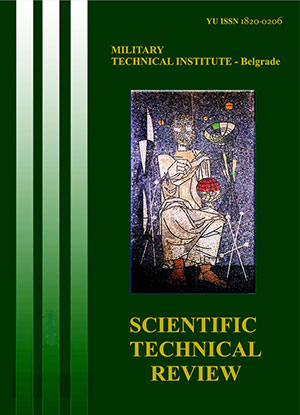|

ISSN: 1820-0206
First published in
1950
About the journal
Editorial board
All
issues
Latest issue
Issue in progress
Publishing
Policy
Guide for authors
Reviwers guidelines
Submit your article
Contact
|
doi:10.5937/str2401021R
Vol. 74, No.1(2024), Pages:
21-35
Impressum
Contents
Long Term
Investigation of Bonding Characteristics Between PVC Based Inhibitor
and HTPB/IPDI Based Propellant
Jovan Radulović
Aleksandar Milojković
Bonding characteristics between extruded polyvinyl chloride (PVC)
inhibitor and casted hydroxyl terminated polybutadiene/isophorone
isocyanate (HTPB/IPDI) propellant, investigated in a long period of
time, are topics of this paper. Basic statements about poly(vinyl)
chloride, extrusion process and PVC tube (including compound
formulation) are presented. There are, also, important
considerations about propulsion systems, HTPB/IPDI propellant,
plasticizer, casting technology and inhibitor. Specimens for
investigation the properties of bond between inhibitor and external
radial surface of solid propellant and specimens for determining the
characteristics of bond between inhibitor and flat surface of solid
propellant are shown.
Two kinds of characteristics of bond between PVC based inhibitor and
external radial surface HTPB/IPDI based propellant were examined:
strength properties and visual appearance. Strength characteristics
include arithmetic mean value of bond strength and arithmetic mean
value and standard deviation of bond strength. Mentioned properties,
as indication of quantitative aspects of tested bond, were obtained
using appropriate method of determination and specific tool,
adjusted to geometry of propellant. Visual appearance of separated
PVC parts and of remaining of PVC inhibitor-HTPB/IPDI propellant
specimens, as indication of qualitative aspects of tested bond, were
tested visually. Based on visual appearance of mentioned separated
parts an assessment of way of separation was done. Strength
characteristic of PVC inhibitor-HTPB/IPDI propellant specimens and
visual appearance of separated parts were determined at the start of
investigation procedure, after five years of ageing and after eleven
years of weathering in warehouse conditions. Both mentioned
properties were tested at temperature 20 oС and temperature 50 oС.
Data obtained by testing PVC inhibitor-HTPB/IPDI propellant
specimens are presented in Tables and in Figures.
Key words: polymeric materials, poly(vinyl chloride),
inhibitor, hydroxyl terminated polybutadiene, isophorone
diisocyanate, propellant, bond strength, quantitative aspects,
visual appearance, qualitative aspects, ageing.
DOWNLOAD PDF
|
